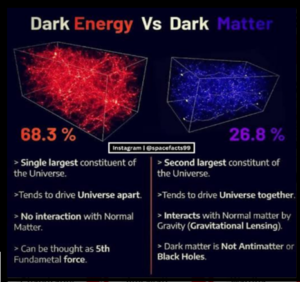THE COSMOLOGICAL CONSTANT PROBLEM: A CRISIS IN PHYSICS
What is Dark Energy?
- A mysterious substance that fills space and causes it to expand is Dark Energy .
- 70% of the universe’s energy is in the form of “dark energy”.
- Unlike other forms of energy (e.g., matter, radiation), dark energy is extremely dilute and difficult to detect.
- The three main contributors to the theoretical dark energy density are:
- The weight of the vacuum (cosmological constant)
- Zero-point energy of quantum fields
- Potential energies of certain fields (e.g., Higgs field)
Source: Space Facts
How much Dark Energy is there?
- Based on the size and age of the universe, we can estimate the amount of dark energy present.
- This calculation suggests that dark energy should be much denser than it actually is.
- In simpler terms, the observed universe is much, much larger than physicists calculate it should be, based on their understanding of dark energy.
The Problem:
- The discrepancy between the predicted and observed amount of dark energy is enormous and inexplicable.
- This is known as the cosmological constant problem and is considered one of the biggest crises in physics.
- Einstein initially introduced the cosmological constant but later abandoned it, calling it his “biggest blunder.”
Why is it a problem?
- The predicted density of dark energy would cause the universe to collapse within a fraction of a second.
- The observed density allows the universe to exist and expand on its current timescale.
- This creates a huge theoretical mismatch, with no convincing explanation for the “missing” dark energy.
Possible solutions:
- Physicists are exploring various theories to explain the discrepancy, such as:
- Fine-tuning the cosmological constant through unknown mathematical principles.
- Modifying our understanding of gravity or other fundamental forces.
- Discovering entirely new physical phenomena related to dark energy.
End Result: The cosmological constant problem remains unsolved, highlighting the limitations of our current understanding of the universe.

 Source: Space Facts
Source: Space Facts

